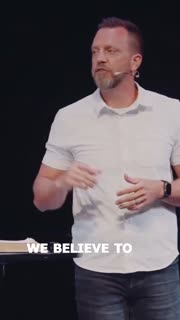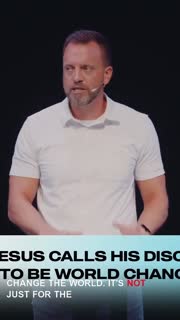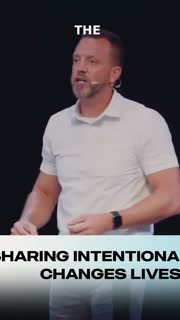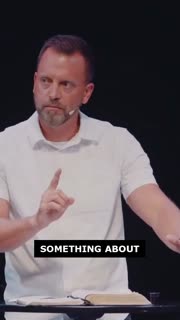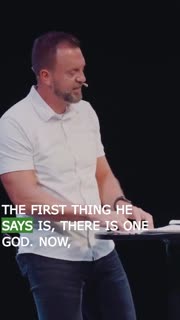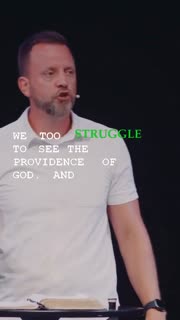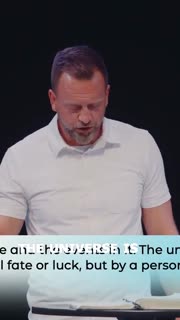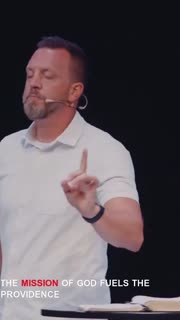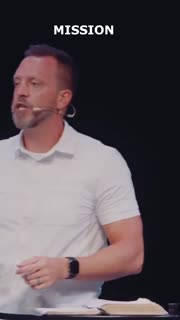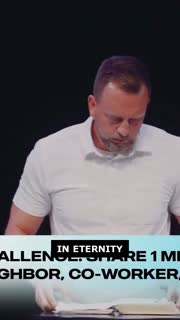Embracing Providence: Ordinary Acts, Extraordinary Impact
Devotional
Sermon Summary
Bible Study Guide
Sermon Clips
1. "We believe to change the world, I need some kind of supernatural gifting or ability. Like, hey, do I need to be an overseas missionary? Don't feel called to that. Can't change the world. I can't preach. I can't play like these musicians. Like, how in the world am I supposed? How am I supposed to change the world? On top of that, many of us just feel like we're just trying to manage life. We find ourselves in a really demanding, busy season. And we're like, if I could just manage my life, that's great. I don't know about changing the world." [00:39] (31 seconds)
2. "Change the world. It's not just for the Billy Grahams. It's actually for me and you. Ordinary Christians, how do we change the world? And one of the ways that we saw in the life of Jesus is the way he performed ministry. It's almost like the dinner table or sharing a meal with others was one of the primary ways in which he spread the kingdom of God and connected with people. So the sharing intentionally of meals changes lives and others." [01:25] (30 seconds)
3. "We've kind of lost the art of sitting around a table. Connecting with people. And yet, again, it's a very ordinary way for us to change the world. The table. So if you and I want to change the world, we've got to express some biblical hospitality. Some intentional meal sharing. I think about some of my deepest friendships. And where some of the conversations of greatest depth happen. And it was around a table. I think about some of the best laughs I've shared with others. It happened around a table. There's something about the table." [02:25] (39 seconds)
4. "I've learned something about God. He uses everything and wastes nothing. I want to take you to the book of Acts. That's where we're going to read today. The book of Acts. Okay. Okay. that I want to point us to today when it comes to changing the world and that is the doctrine of providence." [11:09] (20 seconds)
5. "The first thing he says is, there is one God. Now, in the Greek understanding of gods, they were polytheistic, meaning they believed there were many, many gods, and each god had his own or her own domain. So, when it came to the creation of the world, the Greeks actually believed at this time period that the world was created by lots of different gods. There was one god that created the animals. Then he recruited his brother, and they created humans. And then there was another god, that created the mountains and rivers and valleys. They had all of these gods in their polytheistic culture. And he goes, no, no, no, no. There's not many gods with unique domains. There is one true God." [15:57] (44 seconds)
6. "We too struggle to see the providence of God. And here's why in the modern West, you and I struggle to see God in all the details of life. It's because of this. We fail to really believe in the supernatural and spiritual. We are, because of the advancements in science, we only look at the physical. And so for many of us, if we see something that happens that seems like a coincidence, we chalk it up to luck, to randomness. There was a study that found that 68% of Americans, so more than two-thirds, believe in one kind of luck or another." [21:03] (45 seconds)
7. "The universe is not governed by impersonal fate or luck, but by a personal God. Nothing just happens. We should see God's hand in events throughout the day, causing all things to work together for good for those who love Him. A deepening appreciation for the doctrine of providence will not make us more superstitious, it will make us trust in God more and obey Him more fully. So if you are a Christian, you bear the name of Jesus, we see God in every detail of life. There is no luck, randomness, coincidence. It's all been ordained by Him." [22:54] (43 seconds)
8. "The mission of God fuels the providence of God. And what I mean by that, His mission to save, redeem, and reconcile the lost creation fuels His orchestration and care of every detail in our life, meaning God placed you there so that the glory of God would advance, that more people would worship Jesus in your neighborhood, in your dorm room, in your apartment complex. Why? Because God orchestrates and brings together everything. You live where you live for a reason, for a purpose, and that is to spread the gospel." [24:40] (37 seconds)
9. "We think the mission field is overseas. The mission field is out your front door. The mission field is the moment you walk into work. The, the mission field is the moment you walk onto that field with a bunch of other kids, players. Friends, you have been called to change your world. And God has providentially put you in the places that he has put you in for a reason." [31:29] (24 seconds)
10. "In eternity past, God said, you and I would be in this room right now. Isn't that an overwhelming thought to think about? Like, you and I would be breathing in air in this room right now. God has orchestrated every fine detail of your life to bring you here today and to me here today. Every detail has been worked out, orchestrated. His care for the minutiae of life can be seen right now." [32:58] (30 seconds)
Ask a question about this sermon
2. "Change the world. It's not just for the Billy Grahams. It's actually for me and you. Ordinary Christians, how do we change the world? And one of the ways that we saw in the life of Jesus is the way he performed ministry. It's almost like the dinner table or sharing a meal with others was one of the primary ways in which he spread the kingdom of God and connected with people. So the sharing intentionally of meals changes lives and others." [01:25] (30 seconds)
3. "We've kind of lost the art of sitting around a table. Connecting with people. And yet, again, it's a very ordinary way for us to change the world. The table. So if you and I want to change the world, we've got to express some biblical hospitality. Some intentional meal sharing. I think about some of my deepest friendships. And where some of the conversations of greatest depth happen. And it was around a table. I think about some of the best laughs I've shared with others. It happened around a table. There's something about the table." [02:25] (39 seconds)
4. "I've learned something about God. He uses everything and wastes nothing. I want to take you to the book of Acts. That's where we're going to read today. The book of Acts. Okay. Okay. that I want to point us to today when it comes to changing the world and that is the doctrine of providence." [11:09] (20 seconds)
5. "The first thing he says is, there is one God. Now, in the Greek understanding of gods, they were polytheistic, meaning they believed there were many, many gods, and each god had his own or her own domain. So, when it came to the creation of the world, the Greeks actually believed at this time period that the world was created by lots of different gods. There was one god that created the animals. Then he recruited his brother, and they created humans. And then there was another god, that created the mountains and rivers and valleys. They had all of these gods in their polytheistic culture. And he goes, no, no, no, no. There's not many gods with unique domains. There is one true God." [15:57] (44 seconds)
6. "We too struggle to see the providence of God. And here's why in the modern West, you and I struggle to see God in all the details of life. It's because of this. We fail to really believe in the supernatural and spiritual. We are, because of the advancements in science, we only look at the physical. And so for many of us, if we see something that happens that seems like a coincidence, we chalk it up to luck, to randomness. There was a study that found that 68% of Americans, so more than two-thirds, believe in one kind of luck or another." [21:03] (45 seconds)
7. "The universe is not governed by impersonal fate or luck, but by a personal God. Nothing just happens. We should see God's hand in events throughout the day, causing all things to work together for good for those who love Him. A deepening appreciation for the doctrine of providence will not make us more superstitious, it will make us trust in God more and obey Him more fully. So if you are a Christian, you bear the name of Jesus, we see God in every detail of life. There is no luck, randomness, coincidence. It's all been ordained by Him." [22:54] (43 seconds)
8. "The mission of God fuels the providence of God. And what I mean by that, His mission to save, redeem, and reconcile the lost creation fuels His orchestration and care of every detail in our life, meaning God placed you there so that the glory of God would advance, that more people would worship Jesus in your neighborhood, in your dorm room, in your apartment complex. Why? Because God orchestrates and brings together everything. You live where you live for a reason, for a purpose, and that is to spread the gospel." [24:40] (37 seconds)
9. "We think the mission field is overseas. The mission field is out your front door. The mission field is the moment you walk into work. The, the mission field is the moment you walk onto that field with a bunch of other kids, players. Friends, you have been called to change your world. And God has providentially put you in the places that he has put you in for a reason." [31:29] (24 seconds)
10. "In eternity past, God said, you and I would be in this room right now. Isn't that an overwhelming thought to think about? Like, you and I would be breathing in air in this room right now. God has orchestrated every fine detail of your life to bring you here today and to me here today. Every detail has been worked out, orchestrated. His care for the minutiae of life can be seen right now." [32:58] (30 seconds)
